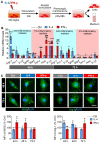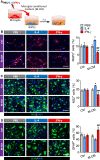The secretome of microglia induced by IL-4 of IFN-γ differently regulate proliferation, differentiation and survival of adult neural stem/progenitor cell by targeting the PI3K-Akt pathway
- PMID: 35733698
- PMCID: PMC9206954
- DOI: 10.1007/s10616-022-00534-2
The secretome of microglia induced by IL-4 of IFN-γ differently regulate proliferation, differentiation and survival of adult neural stem/progenitor cell by targeting the PI3K-Akt pathway
Abstract
Microglia has been reported to be able to regulate the proliferation, differentiation and survival of adult neural stem/progenitor cells (NSPCs) by modulating the microenvironment, which results in different consequences of adult neurogenesis. However, whether the microglial activation is beneficial or harmful to NSPCs is still controversial because of the complexity and variability of microglial activation phenotypes. In this study, we systematically explored the activation phenotypes of IFN-γ- or IL-4-induced microglia at different time after stimulation, and investigated the effects of the secretome of different phenotype of microglia on the process of proliferation, differentiation and survival of NSPCs. Moreover, the possible molecular pathways of secretory influence on NSPCS were further explored using western blotting. The result showed that IFN-γ and IL-4 differently regulate microglial phenotypes, IL-4 induced a M2-like phenotype, while IFN-γ induced a M1-like phenotype. These phenotypes of microglia can only be maintained for 24 h after removal of IFN-γ or IL-4 intervention. The secretome from IFN-γ- or IL-4-induced microglia also had opposite effects on NSPCs proliferation, differentiation and survival. The secretome from the IL-4-treated microglia promoted NSPCs proliferation, survival and differentiation into neurons and oligodendrocytes, while factors secreted by the INF-γ-treated microglia stimulated the NSPCs differentiation into astrocyte, inhibited the neurogenesis and oligodendrogliogenesis, and induced NSPCs apoptosis. Furthermore, the PI3K-Akt pathway mediates the effects of the secretome from IFN-γ- or IL-4-induced microglia on NSPC proliferation, differentiation, and survival. In conclusion, our results suggested that the secretome of microglia induced by IL-4 of IFN-γ differently regulate proliferation, differentiation and survival of adult neural stem/progenitor cell by targeting the PI3K-Akt pathway. These findings will help further study the biological mechanism of microglia regulating neurogenesis, and provide a therapeutic strategy for neurological diseases by regulating microglial phenotypes to affect neurogenesis.
Keywords: Interferon-gamma, Interleukin-4, Neural stem/progenitor cell; Microglia; Neurogenesis; PI3K/Akt pathway.
© The Author(s), under exclusive licence to Springer Nature B.V. 2022.
Conflict of interest statement
Conflict interestAuthor declares that there is no conflict of interest in this research.
Figures








Similar articles
-
M2 microglia promotes neurogenesis and oligodendrogenesis from neural stem/progenitor cells via the PPARγ signaling pathway.Oncotarget. 2017 Mar 21;8(12):19855-19865. doi: 10.18632/oncotarget.15774. Oncotarget. 2017. PMID: 28423639 Free PMC article.
-
Priming of microglia with IFN-γ impairs adult hippocampal neurogenesis and leads to depression-like behaviors and cognitive defects.Glia. 2020 Dec;68(12):2674-2692. doi: 10.1002/glia.23878. Epub 2020 Jul 11. Glia. 2020. PMID: 32652855
-
Microglia-derived interleukin-6 and leukaemia inhibitory factor promote astrocytic differentiation of neural stem/progenitor cells.Eur J Neurosci. 2007 Feb;25(3):649-58. doi: 10.1111/j.1460-9568.2007.05309.x. Eur J Neurosci. 2007. PMID: 17328769
-
Effects of addictive drugs on adult neural stem/progenitor cells.Cell Mol Life Sci. 2016 Jan;73(2):327-48. doi: 10.1007/s00018-015-2067-z. Epub 2015 Oct 14. Cell Mol Life Sci. 2016. PMID: 26468052 Free PMC article. Review.
-
Immunopharmacological intervention for successful neural stem cell therapy: New perspectives in CNS neurogenesis and repair.Pharmacol Ther. 2014 Jan;141(1):21-31. doi: 10.1016/j.pharmthera.2013.08.001. Epub 2013 Aug 15. Pharmacol Ther. 2014. PMID: 23954656 Review.
Cited by
-
Post-Injury Buprenorphine Administration Is Associated with Long-Term Region-Specific Glial Alterations in Rats.Pharmaceutics. 2022 Sep 28;14(10):2068. doi: 10.3390/pharmaceutics14102068. Pharmaceutics. 2022. PMID: 36297504 Free PMC article.
-
Microglia modulate proliferation, neurite generation and differentiation of human neural progenitor cells.Front Cell Dev Biol. 2022 Oct 13;10:997028. doi: 10.3389/fcell.2022.997028. eCollection 2022. Front Cell Dev Biol. 2022. PMID: 36313581 Free PMC article.
-
Transplantation of Wnt5a-modified Bone Marrow Mesenchymal Stem Cells Promotes Recovery After Spinal Cord Injury via the PI3K/AKT Pathway.Mol Neurobiol. 2024 Dec;61(12):10830-10844. doi: 10.1007/s12035-024-04248-8. Epub 2024 May 25. Mol Neurobiol. 2024. PMID: 38795301 Free PMC article.
-
Conjugated therapy with coaxially printed neural stem cell-laden microfibers and umbilical cord mesenchymal stem cell derived exosomes on complete transactional spinal cord defects.Mater Today Bio. 2025 Mar 4;32:101639. doi: 10.1016/j.mtbio.2025.101639. eCollection 2025 Jun. Mater Today Bio. 2025. PMID: 40160243 Free PMC article.
-
Microglia and Microbiome-Gut-Brain Axis.Adv Neurobiol. 2024;37:303-331. doi: 10.1007/978-3-031-55529-9_17. Adv Neurobiol. 2024. PMID: 39207699 Review.
References
LinkOut - more resources
Full Text Sources

